Growing together: cultivating skills in your team
From management to mentorship: a deep dive into skill development for teams
There’s something electrifying about watching someone on your team reach a new milestone. Whether it’s mastering a complex task or gaining a new skill, the moment they ‘get it’ — there’s no other word for it — it’s magic. After spending a decade in the adult learning industry and another five years managing teams, I’ve been lucky enough to witness this process repeatedly. It never gets old.
The manager’s role
Let’s get one thing straight: your role as a manager isn’t just about meeting KPIs or ensuring projects are completed on time. You’re a growth facilitator.
With that in mind, your mission is to create an environment where your team members want to develop. Now, how do you do that?
What drives your team?
The first step involves getting into the psychological shoes of your team members. You can help your people figure out what motivates each individual in your team. Take the time to understand what drives each of your team members.
Is it career growth?
Is it a particular project?
Once you know what fuels each person’s fire, you can start to create conditions for them to start growing.
How humans actually learn:
1. Challenging but not too much
To understand how to help others grow, you need to understand how people learn.
A solid framework in people development is Vygotsky’s zone of proximal development. Vygotsky introduced this concept to describe the sweet spot between what learners can do in autonomy, where they can learn with support (proximal development), and what they can’t do at all. It’s in the “zone of proximal development” that most optimal learning happens because the individual is stretched just enough but not overwhelmed, and supported by others, more knowledgeable then the learner.
This “someone” doesn’t always have to be you. It can be a more experienced team member, a mentor from another department, or even the individual themselves, drawing upon past experience. With technology at our fingertips, sometimes it could even be an expert from halfway around the globe, thanks to online courses and webinars.
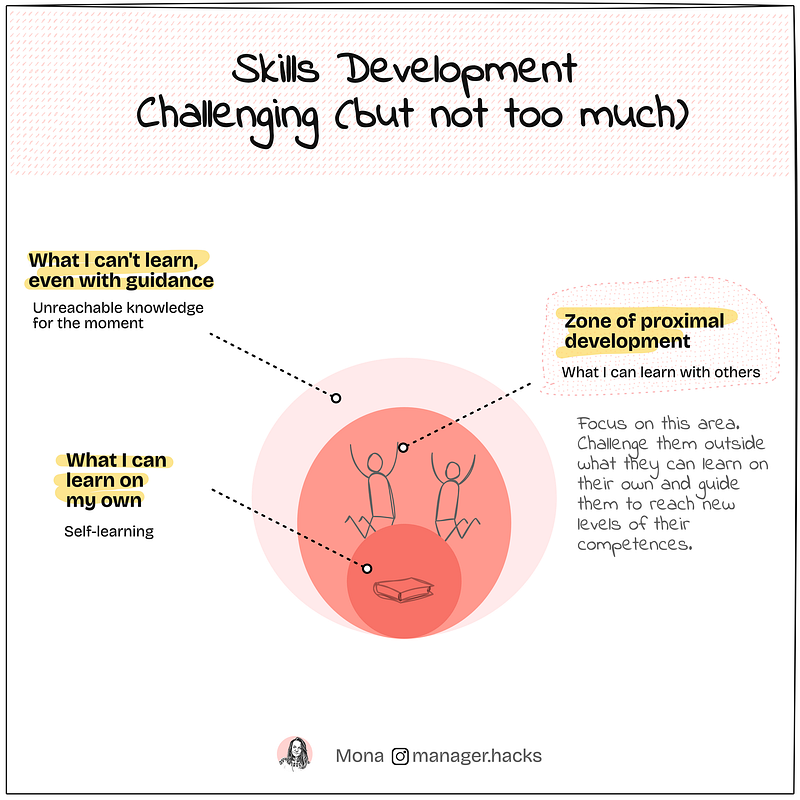
2. Spaced repetition is a good friend
Spaced repetition is a learning technique where information is revisited at increasing intervals over time. While the concept has been around for a while, we still try to cram for our work skills the same way we did at school before an exam. The difference is that as adults we are not aiming for a high score on the year-end exam but to progress with our everyday, natural behaviour and our actions.
The science backing spaced repetition is robust. It taps into the psychological spacing effect: information is better absorbed and retained when learned over a spread-out period.
Our brains encode data into long-term memory more effectively when exposure to that data is spaced across intervals.
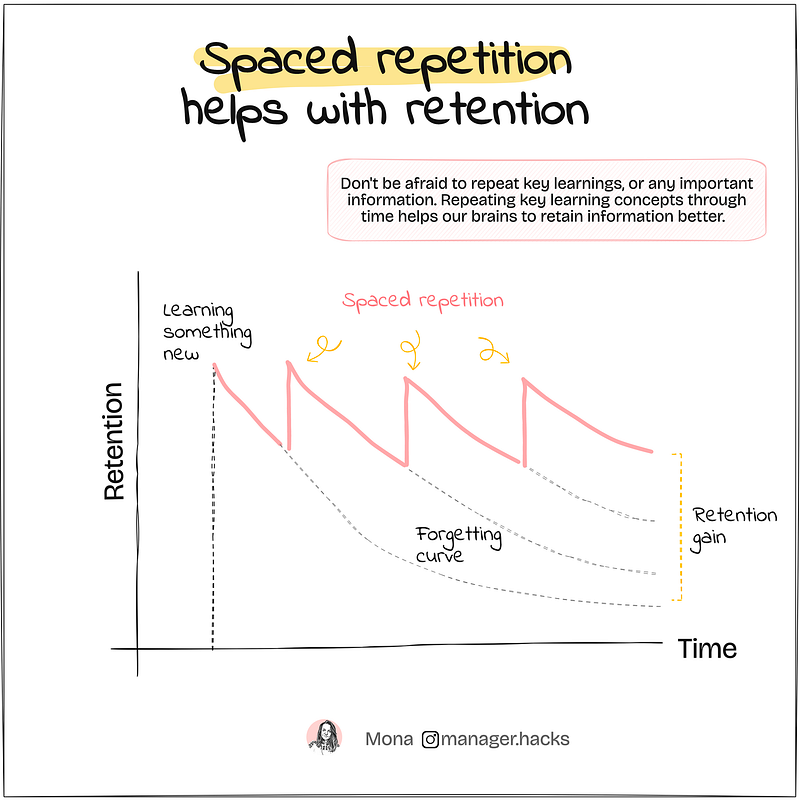
3. Experiential learning
David Kolb built an easy to remember framework on how to learn anything. Effective learning is a cycle: it starts from a concrete experience, moves to observation and reflection, goes through abstract conceptualisation, and then — to active experimentation.
What does this mean at work? Make time for workshops and practical assignments.
This theory basically gives a thumbs-up to getting your hands dirty.
Team members should not only learn new concepts but also be encouraged to apply them in real work scenarios, reflect on the outcomes, and tweak as necessary.
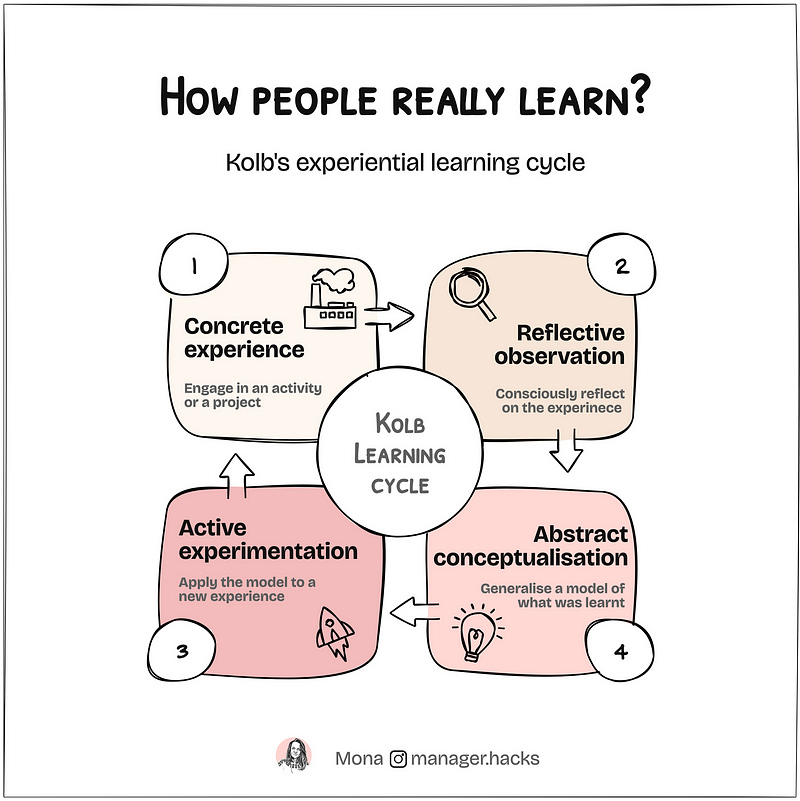
4. Testing oneself
The feeling of fluency tricks us into thinking we’ve mastered a subject. As a manager, you can encourage your team members to directly apply what they have been learning — this will help them immediately see where the gaps are and what to focus on. They will also realise that each skill deserves a proper time of practice before becoming a natural part of our behaviour.
The tools you need
Tool #1: 1:1s: Dialogues, not monologues:
One-on-one meetings are not just updates on projects or performance reviews. They’re also spaces where genuine conversations about career development should occur. This isn’t just beneficial for the employee; it’s also crucial intel for you as a manager to understand where your team wants to go and how you can help them get there.
Tool #2: Competency framework: a living document
Your team should be aware of the skills they’re expected to develop. Create a shared document listing these skills, with clearly defined levels of expertise, each accompanied by specific behaviours or examples. It should be a living document, regularly updated based on team needs and individual growth. Here is how ours look like — it’s a shared sheet with 10 main competences and 4 levels of expertise:
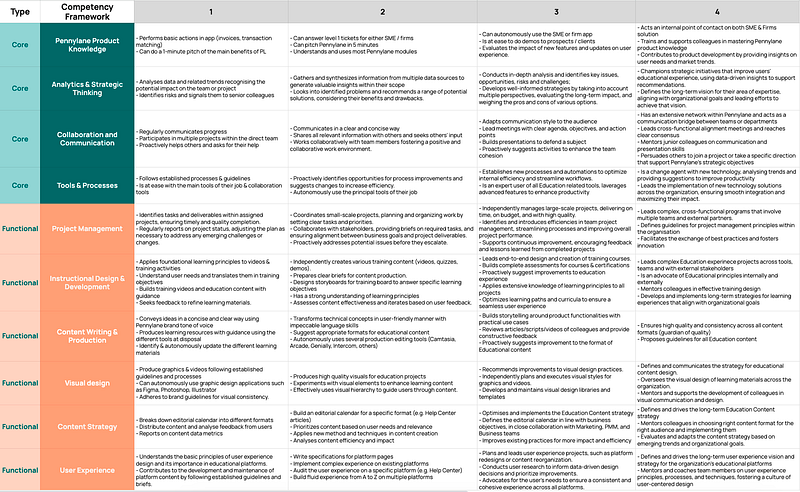
Tool #3: Growth plan — individual roadmaps
While the competency framework provides paths, each individual should have their personalised roadmap.
This is where growth plans come in.
Sit down with your team members individually to plan out skill development trajectories for the next 6–12 months. This isn’t just about what the company needs but also about what they want for their own growth.
Here, a good Notion template comes in handy. It helps you establish individual learning needs and build a skills development roadmap for the next 6 months. Remember to follow-up every month and make sure there are consistent actions to reach the learning goals your team members has set.
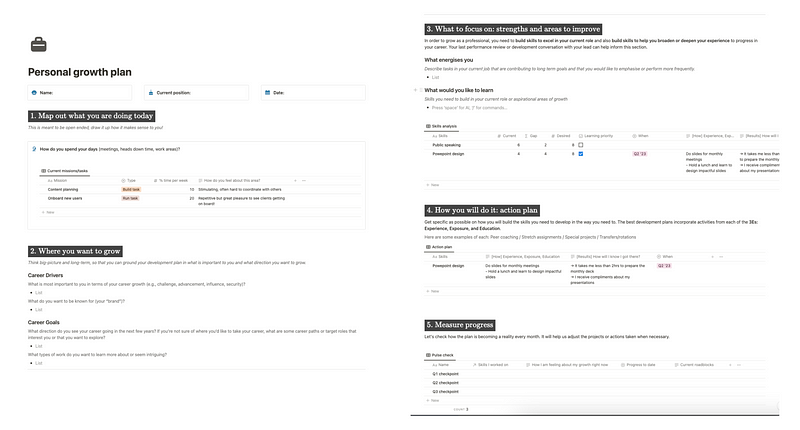
Note: The difference between a Growth Plan and a Performance Improvement Plan
A growth plan is a proactive, forward-looking document that aligns with an individual’s career ambitions and potential. A performance improvement plan, on the other hand, is more of a corrective measure aimed at bringing an underperforming employee up to speed. Know when to use which.
Team learning rituals
We need to ditch the outdated model of “mandatory training sessions.” Create an atmosphere where learning is ongoing and integrated into the work week. Imagine setting aside an hour each week for “Learning hour” or “Think Tank”, as we call it, where team members present a skill or project they’re passionate about. Skill-building in a social setting boosts retention and motivation, and will benefit the entire team.
Establish a team learning culture
Look, I get it; we’re all swamped. But if you claim there’s no time for skill development, you’re setting your team — and yourself — up for stagnation. Skill development isn’t an extra; it’s a necessity. It needs to be included into your weekly planning, even if it’s just a small slice of time set aside for individual or team learning. If it’s not in your capacity tracker, you’re not tracking the right things.
A key lesson I learned in the past few years was the importance of hiring curious people in your team. Curiosity of one individual has a strong positive impact on others in the team as well, especially when you orchestrate learning moments where all curious heads get together, share experiences, pains, and ideas to become a better version of themselves.
Encourage and celebrate questions. Just the other day we had a department meeting and one of my new joiners asked me a question about the meeting content in private. It was a great question, I could have answered but that would have benefited only one person. Instead, I encouraged her to ask it directly in the meeting chat (it was a visio conference) and after she did, the question actually inspired a heated discussion.
Let’s recap: your role in each team member’s growth
Your team’s growth isn’t just another task on your checklist. It’s the legacy you leave in their careers. Your role is to set the stage, offer the tools, and then stand back and watch as each team member uncovers their own brand of magic.
Key concepts:
How humans actually learn
→ Challenging but not too much → Spaced repetition is a good friend → Experiential Learning activates the entire brain and your muscles → Testing oneself helps you fill in the gaps
Templates mentioned
- Growth Plan: A Notion template to create individualised development strategies (that’s one of my templates).
- Competency Framework: A Google Sheet to help categorise and evaluate team skills (get inspired by the screenshot above).
- 1:1 templates for reflective preparation and constructive dialogue (it’s a free template in my collection).
This article is part of the “The First-time Manager Guide”. Follow me to read the series which I would looooove to complete in 2023 (or soon after…)
